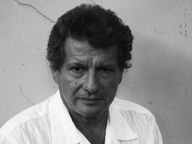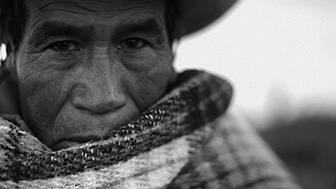Juror
Nicolás Echevarría
 [Juror’s Statement]
[Juror’s Statement]
Gabriel García Márquez once said that two things convinced him to stay in Mexico: the rice, and reading Pedro Páramo, the novel by Juan Rulfo.* When reading about Yamagata I discovered these two coincidences: they say that Yamagata has the best rice in Japan; and Rulfo writes stories about ghosts, suffering souls who wander in the world of the living, also a theme common to Japanese cinema, such as in Mizoguchi Kenji’s Ugetsu Monotagari.
Furthermore, Rulfo reminds me of that strange ritual called sokushinbutsu, in which Buddhist monks, through arduous fasting and strict discipline, aspire to Buddhahood by self-mummification. Rulfo’s ghosts hope to coexist among the living, while the Buddhist monks hope to coexist among the dead.
Rulfo writes about paths that ascend and descend: “The path ascends or descends according to whether you are going or coming. For those who go it ascends, for those who come it descends.” Death is the threshold where bodies and spirits pass from one side to the other, ascending and descending.
The Huichol people call it the “Door of the Clouds,” a border in the geography of the mind: when crossing it, travelers become spirits; it is the entrance to the Home of the Gods.
* García Márquez lived much of his life in Mexico, where he ultimately passed away.
Born Tepic, Nayarit in Mexico, 1947. A filmmaker with a career spanning close to forty years, during which he has made over twenty films in addition to works for television. He has been awarded distinctions such as the Makhila d’Or from the Biarritz Festival; the DICINE from the Muestra de Cine Mexicano de Guadalajara, and L’organisation Catholique Internationale du Cinéma et de l’Audiovisuel (OCIC) prize. Nicolás also received grants from the Rockefeller Fellowship in 2002 and the Guggenheim Fellowship in 1986. His first narrative film Cabeza de Vaca (1991) was officially selected by the 1991 Berlin International Film Festival, and was chosen to participate in the sixty-third Academy Awards. The most recent film Echo of The Mountain (2014) have been shown in various film festivals in the world.
Echo of The Mountain
Eco de la montaña MEXICO / 2014 / Spanish / Color / Blu-ray / 91 min
MEXICO / 2014 / Spanish / Color / Blu-ray / 91 min
Director, Script: Nicolás Echevarría
Appearance: Santos Motoapohua de la Torre
Photography: Nicolás Echevarría, Sebastián Hofmann
Editing: Omar Guzmán Music: Mario Lavista
Sound Design: Sergio Diaz
Producers: Jose Álvarez, Julio Chavezmontes, James Ramey, Michael Fitzgerald
Production Companies: Cuadro Negro, Ithaca LLC, Amadís, Diorama, Piano
Source: Piano www.somospiano.com
Made with beads, the wall paintings of the Huichol people of Mexico are recognized around the world for their cultural value. Yet, the lifestyle and cultural traditions of the tribe are disappearing. With the goal of creating a new painting, Huichol artist Santos sets off on foot on a 620-kilometer peyote pilgrimage to the sacred site of Wirikuta, where he offers sacrifice and seeks divine forgiveness. Santos haltingly tells of the history, culture, and myths embedded in his people’s vividly colored wall paintings. The profound world he weaves is contrasted by the harsh natural weather of the sacred land, which its inhabitants abandon, threatened by the waves of economic development. The director diligently records the indigenous lifestyle and culture, depicting the present reality of the Huichol people through Santos’ voice and painting.
